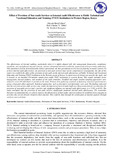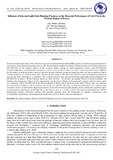INTERNAL AUDIT INDEPENDENCE AND INTERNAL AUDIT EFFECTIVENESS IN PUBLIC TECHNICAL AND VOCATIONAL EDUCATION AND TRAINING INSTITUTIONS IN WESTERN REGION, KENYA.
Abstract
The effectiveness of internal auditing, particularly when it is tightly aligned with risk management frameworks, compliance standards, and strengthened internal controls, garners a significant amount of attention from governing authorities all around the world. This focus is a direct result of the one-of-a-kind operational function that governmental divisions play in the stimulation of economic activity. Independence for internal audit is something that cannot be compromised if optimum results are to be achieved. As a result, the study aimed to establish the effect of internal audit independence on the internal audit effectiveness of Public Technical and Vocational Education and Training (TVET) Institutions in Western Kenya. The following are the specific objectives for the research: to establish the effect of scope of work of internal auditors on internal audit effectiveness in Public TVET Institutions in Western region; to determine the effect of access to audit evidence on internal audit effectiveness in Public TVET Institutions in Western; to establish the effect of the level of reporting of internal auditors on internal audit effectiveness in Public TVET Institutions in Western region; to examine the effect of provision of non-audit services on internal audit effectiveness in Public TVET Institutions in Western region. The research was founded on three theoretical pillars: the theory of agency, institutional theory, and inspired confidence theory. Agency theory was primarily responsible for shaping the research outlines. A causal research design was employed, and it focused on an intended 116-member sample from Public TVET Institutions in western Kenya. This sample included senior management, internal auditors, and the audit committee. Stratified and simple random sampling approaches were used to select 89 individuals to partake in the study. The primary data gathering consisted of deploying structured questionnaires using a drop-and-collect approach. Both the reliability of the tool as computed by Cronbach's alpha and its validity as determined by content validity were subjected to investigation. Statistical approaches such as descriptive and inferential were utilized to determine the relationship between dependent and independent variables. In addition to this, multiple regression analysis was used to ascertain the effect of internal audit independence on internal audit effectiveness. The findings showed that internal audit independence accounted for 31.3% of the variances in internal audit effectiveness in Public TVET institutions in Western Kenya (R2= 0.313, P= <.001). The hypotheses were therefore rejected. The study supports the idea that public TVET institutions in Kenya should set up internal audit functions that are completely independent of management and should have unrestricted access to evidence. To build up the effectiveness of their audits, internal auditors need to have the freedom to define the scope of the work, be required to communicate their findings directly to the audit committee, and be restrained from undertaking activities that are not directly related to their function.
Collections
Related items
Showing items related by title, author, creator and subject.
-
Effect of Provision of Non-Audit Services on Internal Audit Effectiveness in Public Technical and Vocational Education and Training (TVET) Institutions in Western Region, Kenya
Aluvala, Beryl Lihavi; Tibbs, Charles. Y.; Kiongera, Fredrick (AFRICAN JOURNAL OF EMPIRICAL RESEARCH, 2023-10-19)The effectiveness of internal auditing, particularly when it is tightly aligned with risk management frameworks, compliance standards, and strengthened internal controls, attracts substantial attention worldwide, particularly ... -
Influence of Internal Audit Risk Planning Practices on the Financial Performance of SACCOs in the Western Region of Kenya
Simbiri, Alex Mahiva; Musiega, Maniagi; Edwin, Jairus Simiyu (AFRICAN JOURNAL OF EMPIRICAL RESEARCH, 2023-10-12)To better monitor and control risks, businesses may use risk-based internal audit (RBIA) practices. It also increases transparency and honesty in the financial reporting process. The Western Region and Kenyan Deposit Taking ... -
Influence of Management Input on Effectiveness of Saccos Internal Audit in Western Kenya
Achola, John; Maniangi, Musiega; Fredrick, Kiongera (Sustainable Business and Society in Emerging Economies, 2024-06-30)Purpose: Examination of management input on effectiveness of Saccos internal audit in Western Kenya. Methodology/Approach: Employing causal design for cause and effect association, a target of 129 staffs in 15 DT-SACCOS ...


